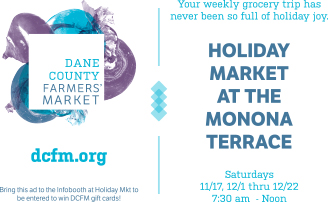by Andy Gricevich, Newsletter Writer
At Willy Street Co-op, we’re willing to answer just about any question. Though it’s unrealistic to expect that everyone working at one of our stores would know about every product and policy related to their store, striving toward that goal is an important part of our customer service philosophy. If we don’t know the answer to something, we’ll refer you to someone who does, but we’re curious and inquisitive enough that we want to learn for ourselves as well.
Certain questions come up again and again. Some are thoroughly straightforward, while others open up a can—even a six-pack—of worms. We thought we’d publish some of the questions we hear most frequently in each of our retail departments, to get the answers to as many of our customers as possible (in a few cases, answers may vary between sites).
PRODUCE
Is your produce organic?
We carry both organic and conventional produce at all stores, although the ratios vary. At Willy East and Willy West stores, up to 97% of the produce we carry at any given time is certified organic, and there’s always plenty available at North as well. Because our stores aren’t themselves certified organic sites, you’ll see the phrase “organically grown” on our signage. We also often carry “conventionally grown” produce that’s essentially organic, or otherwise sustainably grown.
What’s the difference between the orange sweet potato varieties?
Garnet sweet potatoes are a bit richer in color and a little softer, with a slightly higher sugar content; they’re best for mashing. Jewels and Beauregards, a little firmer and drier, are best in casseroles, or for sweet potato fries.
How do I cook chard, lacinato or purple kale?
They’re very versatile! Sautée them (garlic, olive oil, and lemon juice is a classic combo) or use them in soups or casseroles. Chard is closer to spinach; lacinato is more tender than purple or green kale.
How do I get the seeds out of a pomegranate?
Here’s our favorite method: cut the pomegranate in half along its “equator.” Turn each half upside-down over a bowl of water and give it five or six good whacks with the round back of a large spoon, until the seeds have fallen into the water. Any white pith that goes in with them will float to the surface, where you can skim or pour it off. Drain the water, and there you have your delicious seeds!
This local product is at the farmers’ market stand for this grower. Why don’t you have it here?
Often, the answer is that the grower in question only has enough product for a few cases, and it’s to their financial advantage to sell it all at market, rather than through a retail store, where the profit would be lower for the producer.
GROCERY
Where are your pine nuts?
We stock pine nuts in the refrigerated cooler in our bulk aisle. That’s also where you’ll find flax meal, organic walnuts, and other products that tend to degrade in quality quickly when stored without refrigeration.
There have been big problems internationally with fake or adulterated “olive oil.” Which brands can I trust to contain only pure olive oil?
There are a few dependable routes. Go with one of our domestic, single-producer California brands, like Bariani. Olio Beato is a reliable, extensively tested import. Paleon is a Madison business sourcing its oil directly from family producers in Greece. Riojana is a co-op that works only with co-ops. Canaan is a Palestinian company with its national headquarters in Madison; they work with small growers, especially with women farmers, and do good work all-around, including negotiating the difficulties of export from Palestine under current political conditions.
Which oils work well for high-heat cooking?
“Smoke point” is a significant issue—a healthy oil, when overheated, becomes distinctly unhealthy. Grapeseed oil is great for high heat; nearly flavorless, it’s also nearly zero-waste, as a byproduct of winemaking. Refined coconut oil is a good, if much more flavorful, alternative, and avocado oil is also popular and heart-healthy. Try Driftless Organics locally grown and pressed sunflower oil. We haven’t researched algae oil as extensively, but it looks to be another healthy oil for high-heat applications.
What’s the difference between pasteurized and ultra-pasteurized milk? Do you carry unpasteurized dairy?
Ultra-pasteurized milk is heated to a high temperature (280ºF, for about two seconds) to kill off more of the bacteria in milk than get zapped by traditional pasteurization. That makes for a very long shelf life in unopened containers of milk. It also affects the nutritional value of the milk adversely, degrading proteins and reducing some vitamin content. Unpasteurized (raw) milk is illegal for sale in Wisconsin (as in most states), except as the basis for raw milk cheeses, which we do carry.
Do you carry water-processed decaf coffee?
Yes—all the bulk coffee we carry is either organic or naturally processed. No chemical decaffeination.
MEAT
Do you have fresh turkey available at any other time than November?
No. Most turkeys are raised to be slaughtered in early November and kept fresh through Thanksgiving, so thawed turkey is the only option until fresh birds arrive for the season.
Why is there no grading system for grass-fed beef?
The grading system is set up for large-scale, industrialized beef production based on force-feeding grain. That system allows for meticulous control, basically engineering the bodies of the animals. Grass-fed beef comes from a variety of much smaller operations, and the natural diet and grazing behavior of their cattle allows for greater variation in their development.
Do you have grass-fed chicken and pork?
Chickens and hogs are omnivores. Chickens naturally eat green plants, bugs and worms, as well as seeds and grains. Hogs eat plants and their roots and seeds, nuts and fruits, rodents and even snakes. We do carry free-range chicken and pork from hogs raised naturally on pasture.
How do you cook grass-fed beef?
For steaks and burgers, go with shorter cooking times at higher heat. Give cooked steaks a 5-10 minute rest before eating. Instead of this “quick and high” method, you can also get good results with a lower-temperature oven or slow-cooker method. That’s definitely what you want for the bigger cuts like arm roasts and briskets, where it’s often best to cover the meat for at least half of the cooking process, and to give roasts cooked without liquid a longer rest period.
DELI
Do you have chickens?
We usually have roasted chickens available on a daily basis. If no hot chickens are out, there are likely more waiting in the wings. We also stock cooked, cooled whole chickens in our Grab & Go case.
Are the chickens organic?
No. We use Bell & Evans all-natural antibiotic-free chicken.
What’s the difference between the varieties of turkey in the Deli case?
Michigan Turkey is raised on clean feed on a number of Michigan farms. Ferndale turkey is clean, free-range, and more minimally processed. At East and West, we offer Golden Legacy Turkey from Michigan Turkey Producers that is raised without antibiotics on vegetarian feed. At North, we offer Golden Legacy Black Label Turkey that uses whole turkey breasts and no artificial binders or starches and commands a lower price point.
Do you have salami?
With the addition of Underground Meats’ local, traditionally cured salami, the answer is finally yes!
HEALTH & WELLNESS
Tell me about CBD products.
That’s a topic that deserves—and that probably will get—a full article in the Reader. See the November issue for a brief outline of some of the products we’re carrying.
Should I buy chelated mineral supplements?
It’s a complicated issue! Chelation is the process of binding molecules of minerals to organic molecules—usually amino acids—to prevent the minerals from being flushed from our systems before we can absorb them. Evidence indicates that this works well sometimes; different minerals bind to different organic compounds and not others, and are absorbed by different tissues. Also, bioavailability (the usability of nutrients by our bodies) of some minerals depends on the presence of other minerals. In some cases, chelation might be ineffective or even counterproductive. There still needs to be more targeted research on the topic.
What are the differences between whole-food, food-based, and other types of supplements?
There’s no perfect answer to this question, as regulations on what can be said about supplements are extremely loose. At least three different kinds of supplements can be labelled as “whole-food.” First, there’s the standard capsule of synthetic vitamins and minerals, combined with dried plant foods and additives. Evidence on the effectiveness of synthetic nutrients is all over the place and specific to each nutrient; some of it definitely suggests serious issues with non-absorbability and even toxicity. In another method (employed by New Chapter and Megafood, often labelled “food-based”), synthetic nutrients are fed to yeasts, which absorb them into their own cell structures, making them more bioavailable to us, though they’re present in lower concentrations than in standard capsules. These supplements may also cause problems for people with yeast sensitivities. Finally, we have products composed partially or exclusively of dehydrated natural foods. Servings of these supplements provide even lower concentrations of each nutrient, so they often come in powdered or liquid form to facilitate larger doses. Since they’re “just food,” it seems like they should provide high bioavailability—but there are also concerns that the food combinations included pit nutrients against “antinutrients” that block their absorbability. None of these products can replace a healthy, varied diet—but any of the alternatives might provide important additional support, especially for individuals with certain needs and conditions. This issue could easily fill an entire article, which would still probably fail to answer the question in a satisfactory way.
FRONT END/CUSTOMER SERVICE
Do you have a list of all your gluten-free items?
At least once a year (before Thanksgiving), we update our list of vegan or gluten-free products. It is not exhaustive, and it is subject to change, but it’s a solid list. Because manufactures can change their ingredients at any time, we always recommend double-checking a label before purchasing any product on our list.
Do you take EBT? Do you take WIC?
Yes, we accept EBT at all three of our locations. Our North store also accepts WIC.
Does the Co-op provide catering?
Yes! Our catering menu is available at the Customer Service desk. Catering orders may be picked up at any of our stores, and delivery is available for an additional charge. You can find more info on our website at www.willystreet.coop/catering. You can also contact Bill Pohlman at (608) 237-1201 or This email address is being protected from spambots. You need JavaScript enabled to view it..
What’s on the hot bar today?
We post our menus daily on our website (at willystreet.coop/menus), but for the most accurate information you’ll want to call the store directly. Sometimes we have to make last-minute changes to our planned menus, or we run out of certain dishes.
Is CHIP tax-deductible? Do I have to save all of my receipts for tax purposes?
Yes, the CHIP donation (to Community Shares of Wisconsin, who distributes it to more than 60 local nonprofits) is tax deductible. You can pick up a record of your CHIP donations for the previous year for tax purposes at any customer service desk.
Do you have a fax machine/printer/copier I can use?
We don’t have one in a publicly accessible location. At North, though, you can use the library next door (when open), and there’s a UPS store next to West.
What’s the difference between Owner Rewards, Co-op Basics and Co-op Deals?
The Owner Rewards program offers sales to shoppers with an ownership share in the Co-op. Any product in the store could be an Owner Rewards item for a week or two; we might decide to feature an unfamiliar produce item from a small local farm, or highlight a new bakery item in our deli. Almost all of our produce sales are Owner Rewards. Co-op Basics discounts are available to anyone shopping at the Co-op. They’re typically everyday staple foods like olive oil, apples, and canned beans. Co-op Basics items are usually sourced from larger-scale natural foods producers and distributors, who can offer us big quantities of product, at a discount we then pass on to you. They aren’t sale items, but are at an everyday low price year-round. Co-op Deals are sales that change every two or three weeks—mostly, again, on stuff from larger producers, and mostly (though not exclusively) set up by National Cooperative Grocers for its member stores.
There you have it
There you have it: some of our most frequently asked questions and their answers. We hope this has been helpful and informative. Remember, if you have any questions for us, you can give us a call, write us an email, or stop in at one of our stores. Our staff will happily do what they can to get you the answer.



